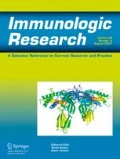Dear Editor,
The global pandemic of COVID-19 is currently ongoing [1]. To date, pharmacological agents used to treat patients with COVID-19 have been directed at avoiding and reducing the severe complications of the disease [2,3,4,5]. Recently, the first vaccines [6,7,8,9] and monoclonal antibodies directed against SARS-CoV-2 have been authorized [10, 11], representing potential treatments to defeat the global pandemic of COVID-19. However, we believe that there are still several aspects to be clarified. In particular, with the availability of SARS-CoV-2 vaccines, an important issue is the prioritizing of population groups to administer the first doses of vaccine. Epidemiologic evidence shows that older individuals and those with preexisting comorbidities, particularly cardiac, metabolic, and respiratory disease, are at increased risk for severe COVID-19 infection. Vaccination priority should probably be given to this category of individuals. Another question to be clarified is whether vaccines will also be effective against emerging variants of SARS-CoV-2. To date, evidence shows efficacy against the English, Brazilian, and South African variants [12]. Probably, the different types of antibodies induced by vaccination are able to fight these newly identified variants of SARS-CoV-2 [13], since they are characterized by few mutations affecting the (S) spike protein of the virus. However, when there will be thousands of mutations in SARS-CoV-2, will the current vaccines still be effective? Or will there be a need for periodic booster vaccinations? As is the case with flu vaccines? In addition, new monoclonal antibodies directed against the spike protein of SARS-CoV-2 have recently been authorized, through their mechanism of action, prevent endocellular penetration, and reduce viral load. These monoclonal antibodies are indicated for adult patients with COVID-19 comorbidities and risk of hospitalization [6, 7], but their precise role on the right timing of administration and in which individuals to administer them, or at what stage of the disease, probably remain to be fully identified. Furthermore, are monoclonal antibodies effective against SARS-CoV-2 variants? These important questions remain to be clarified. Certainly, the availability of COVID-19 vaccines and monoclonal antibodies directed against SARS-CoV-2 represent potential therapeutic weapons to halt the global pandemic permanently; however, clinical trials are urgently needed to further clarify important aspects.
Availability of data and materials
Full availability of data and materials.
References
Wang C, Horby PW, Hayden FG, Gao GF. A novel coronavirus outbreak of global health concern. Lancet. 2020;395:470–3.
Vitiello A, Ferrara F. Pharmacological agents to therapeutic treatment of cardiac injury caused by Covid-19. Life Sci. 2020;1(262):118510. https://doi.org/10.1016/j.lfs.2020.118510.
Vitiello A, Pelliccia C, Ferrara F. Drugs acting on the renin-angiotensin system and SARS-CoV-2. Drug Discovery Today. 2021. https://doi.org/10.1016/j.drudis.2021.01.010.
Vitiello A, Ferrara F. Remdesivir versus ritonavir/lopinavir in COVID-19 patients. Ir J Med Sci. 2020;18:1–2. https://doi.org/10.1007/s11845-020-02440-y.
Vitiello A, Ferrara F. Remdesivir versus ritonavir/lopinavir in COVID-19 patients. Ir J Med Sci. 2020;18:1–2. https://doi.org/10.1007/s11845-020-02440-y.
Voysey M. Safety and efficacy of the ChAdOx1 nCoV-19 vaccine (AZD1222) against SARS-CoV-2: an interim analysis of four randomised controlled trials in Brazil, South Africa, and the UK. Lancet. 2021;397(10269):99–111. https://doi.org/10.1016/S0140-6736(20)32661-1.
Mercado NB, Zahn R, Wegmann F. Single-shot Ad26 vaccine protects against SARS-CoV-2 in rhesus macaques. Nature. 2020;586:583–8. https://doi.org/10.1038/s41586-020-2607-z.
Sadoff. Interim Results of a Phase 1–2a Trial of Ad26.COV2.S Covid-19 Vaccine. N Engl J Med. 2021 NEJMoa2034201. https://doi.org/10.1056/NEJMoa2034201.
Tian JH, Patel N, Haupt R. SARS-CoV-2 spike glycoprotein vaccine candidate NVX-CoV2373 immunogenicity in baboons and protection in mice. Nat Commun. 2021;12:372. https://doi.org/10.1038/s41467-020-20653-8.
Malani PN, Golub RM. Neutralizing monoclonal antibody for mild to moderate COVID-19. JAMA. Published online January 21, 2021. https://doi.org/10.1001/jama.2021.0585.
RL Gottlieb, A Nirula, P Chen (2021) Effect of bamlanivimab as monotherapy or in combination with etesevimab on viral load in patients with mild to moderate COVID-19: a randomized clinical trial. JAMA. Published online January 21, 2021. https://doi.org/10.1001/jama.2021.0202
Y Liu, J Liu, H Xia, X Zhang, CR Fontes-Garfias, KA Swanson, H Cai, R Sarkar, W Chen, M Cutler, D Cooper, SC Weaver, A Muik, U Sahin, KU Jansen, X Xie, PR Dormitzer, PY Shi (2021) Neutralizing activity of BNT162b2-elicited serum. N Engl J Med. 2021 Mar 8. https://doi.org/10.1056/NEJMc2102017.
Fontanet A, Autran B, Lina B, Kieny MP, Karim SSA, Sridhar D. SARS-CoV-2 variants and ending the COVID-19 pandemic. Lancet. 2021;S0140–6736(21):00370–6. https://doi.org/10.1016/S0140-6736(21)00370-6.
Author information
Authors and Affiliations
Contributions
AV: Conceptualization, Writing — original draft, Methodology, Writing — original draft. LP: Writing — review & editing, Supervision, Validation. FF: Writing — review & editing, Supervision, Validation. All authors read and approved the manuscript, and all data were generated in-house, and that no paper mill was used.
Corresponding author
Ethics declarations
Ethical approval
Not applicable.
Consent to participate
Not applicable.
Consent to publish
The authors consent to the publication of the manuscript.
Conflict of interest
The authors declare no competing interests.
Additional information
Publisher's note
Springer Nature remains neutral with regard to jurisdictional claims in published maps and institutional affiliations.
Rights and permissions
About this article
Cite this article
Ferrara, F., Pianesi, L. & Vitiello, A. COVID-19 global pandemic: vaccines and new monoclonal antibodies, aspects to be clarified. Immunol Res 69, 115–116 (2021). https://doi.org/10.1007/s12026-021-09193-5
Received:
Accepted:
Published:
Issue Date:
DOI: https://doi.org/10.1007/s12026-021-09193-5

